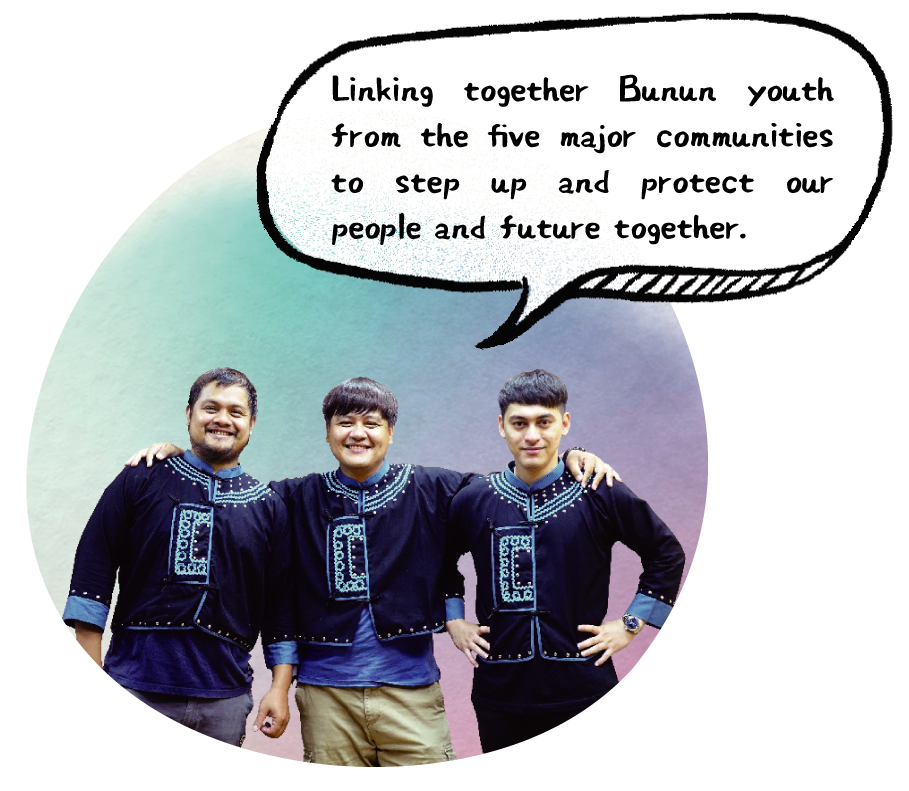

The Taitung Bunun Youth (TBY) was established by a group of twentysomething Bunun youths in 2015. The organization is mainly composed of young people. Going beyond Bunun traditions, Taitung Bunun Youth sets up a conversation platform for the modern Bunun youth and helps the younger generation relearn their own culture.
“The hunter is innocent; the law is unconstitutional!” “Safeguard our sovereignty, defend traditional territories!” Bunun youth from the five major communities on both sides of the Central Range gathered at Puli Township, Nantou County, to jointly show support of the constitutional interpretation of the Bunun hunter Talum case and the “Katratripulr Safeguarding Sovereignty and Defending Traditional Territory Declaration.”
Taitung Bunun Youth from Taitung was one of the supporters present. They believe that the right to hunt and land ownership rights are not issues of one single community or people, but related to the culture of Taiwan’s indigenous peoples. Especially the Right to Hunt dispute, which was ignited by Bunun hunter Talum, is closely related to the daily life and culture of the Bunun people. The sense of loss kindled by the disappearance of traditional culture is exactly the reason why TBY was born.
In 2015, a group of Bunun youths who had just graduated from university or graduate school returned to Taitung. Sensing that modern society has changed the traditional Bunun way of living, which used to be centered around the clan, the young group decided to set up a platform on which everyone could converse equally. The platform, named “Taitung Bunun Youth”, is an extension of the traditional Bunun concept of “tastu baning” (sharing the same cooking stove) and represents a new foundation for Bunun culture.
We Need to Give Young People Opportunities
to Stay in Their Communities
Since its initiation, Taitung Bunun Youth has grown from a couple dozen of members into an organization with nearly a hundred members. In the past six years, they mainly focused on reviving their traditional culture. Activities included holding weaving courses, planting traditional crops, visiting and surveying traditional territory, and studying old houses. Every year TBY alternatively hosts the Taitung Bunun Youth School and Palihansiap Bunun Studies Forum. The Taitung Bunun Youth School organizes a one-week long summer course for teenagers in high school and up to learn about Bunun culture. And the Forum aims to establish a Bunun knowledge system and invites community elders, culture workers, and young people to participate and interact with each other.
After accumulating lots of experience and resources, Taitung Bunun Youth gradually became involved in developing community industries. TBY Managing Supervisor Vilian Istandaa mentioned that long before “local revitalization” was a trend, Taitung Bunun Youth was already working on cultural empowerment and resource inventory. “Our ultimate goal is to find opportunities for the younger generations so that they can stay and live in their communities and really put down roots there.”
In addition to working with the public sector to roll out local revitalization projects, TBY also helps villages set up personal workshops for weaving and garment making. They hope that in the future they can work closer with local communities and help set up sustainable development projects.
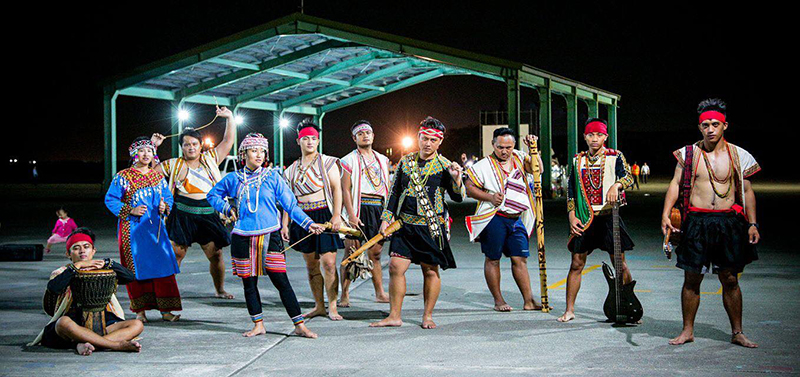
Taitung Bunun Youth also has a band. They use music to share Bunun stories with more people.
Spreading Out
into Different Areas
Traditionally, the clan is the unit in Bunun social structure and daily life. The concept of “the entire village” is not very prominent. While public affairs are decided by village leaders, most affairs are presided and decided by the elders in the family. The younger generation is expected to obey and carry out the results. In addition, unlike the Pangcah or Pinuyumayan, the Bunun society does not have an “age class” structure which cultivates the concept of “our village” in community children.
“Our people also have another characteristic. If we don't agree with you, we just leave.” Qubiaz Tamapima, the fourth board director of Taitung Bunun Youth, said with a smile. The Bunun people are quite reserved. If the family heads don’t agree with each other, they tend to avoid direct conflict. “We will leave quietly and withdraw from the discussion.” This trait also makes the sense of “one whole village” rather weak among the Bunun.
To focus on community consensus, TBY went beyond the traditional mindset and created a communication platform with a modern organizational structure for the younger generation. Compared with other peoples who have youth organizations with age classes, Vilian Istandaa believes that the structure of TBY is very different. “Taitung Bunun Youth doesn’t have strict restrictions related to age. Regardless of your age, we can all converse on equal footing.” When there are disagreements within the organization, members used the traditional Bunun palihansiap (“discussion”, “to hold a meeting”) mechanism to discuss the issue and vote on the outcome.
Yet would this practice impact community culture? “We never wanted to change or challenge village traditions. It’s more like we are brainstorming for new directions.” Taitung Bunun Youth Director Manama Binkinuan explained. “If our village needs people to help out, we go and lend a hand. If they need funding, we go look for resources.” Just like the traditional concept of kiudu (“taking turns to work”), TBY connects Bunun youth from various villages in Taitung and encourages them to find their indigenous identity and be involved in related affairs. TBY assists communities when they need it and carries on traditional mechanisms through modern means.
When Taitung Bunun Youth was first established, community elders were skeptical about the idea. Qubiaz Tamapima explained, “although the Bunun greatly respect the elders, we also recognize people ‘that can do things’”. As TBY gradually showed positive results, the elders began to understand that the youth are truly working for the community. They were then more than happy to offer assistance and support, and became a strong force in helping Taitung Bunun Youth promote their traditional culture.
“We hope that the youth who are part of Taitung Bunun Youth can eventually return to their own communities. Hopefully, they will continue to be involved in public affairs and become the pillars of the community. We also wish that they can do well in different industries. Only when we have our people in every area can we change the current situation.” Vilian Istandaa remarked.
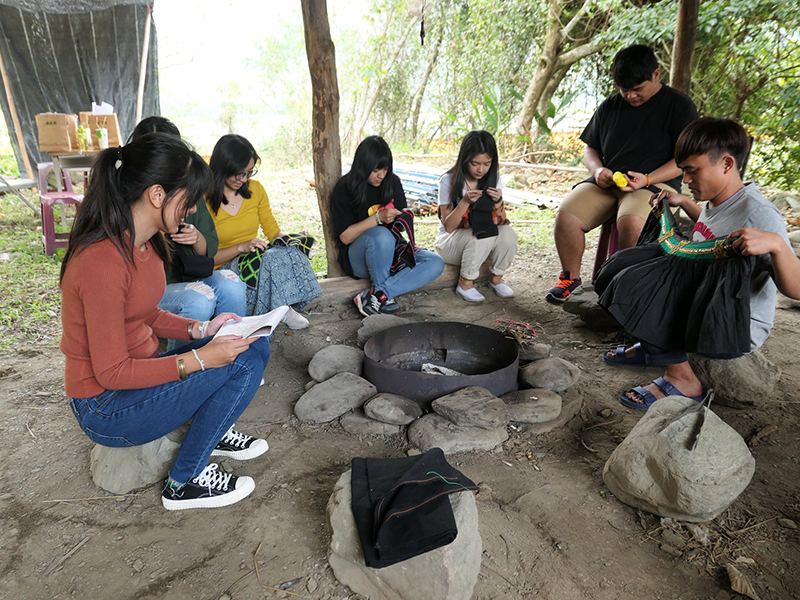
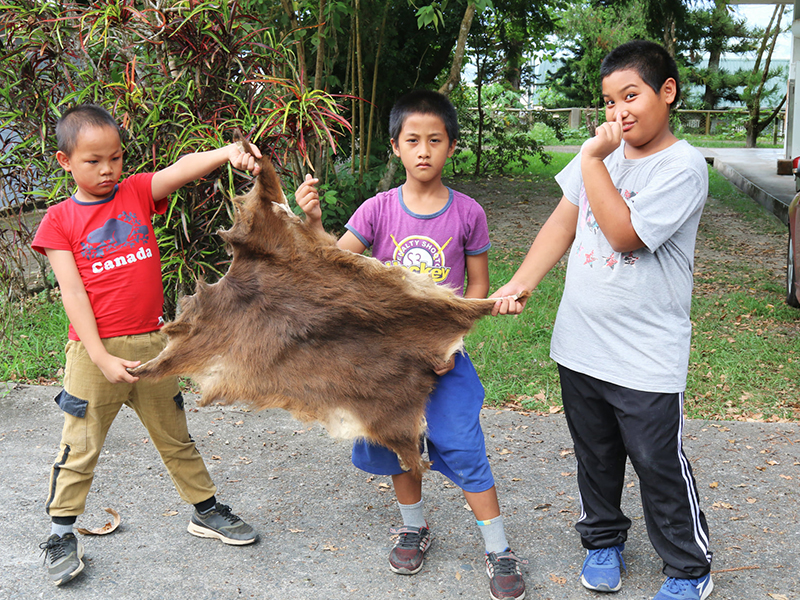
The Taitung Bunun Youth School revives traditional crafts by teaching the students cross-stitching, weaving, and tanning.
Let the Voices of Bunun People
from All Corners be Heard
Looking back, the core members that set up Taitung Bunun Youth have grown from youths in their twenties to adults nearing their forties. To pass on the torch of Taitung Bunun Youth, they started “youth squads” to empower new members from the communities or participants of Taitung Bunun Youth School. Vilian Istandaa admitted that it’s difficult to pass on the mission as all the work done in TBY are unpaid. Members who have day jobs are working for TBY in their own free time. In addition, indigenous young people rarely have the choice to return to their villages as there are few job opportunities. This is a challenge common among modern indigenous youth.
Nevertheless, the fourth director and supervisor team, which has just come into office, is not discouraged. “For our generation, we had to figure out our self-identity on our own. The next generation is a bit luckier, at least they have the senior members of TBY to help them learn more about their own culture.” For Qubiaz Tamapima, Taitung Bunun Youth is still a relatively young organization. They ran into many obstacles along the way and fortunately had each other to lean on and learn from. “We will continue to spread and promote our culture. Hopefully among the many sparks, we can find a fire that burns a little brighter and keep on passing down the energy of Taitung Bunun Youth from generation to generation.”
“Taitung Bunun cannot represent all Bunun people. We hope that Bunun youth all over Taiwan can form their organizations and let the voices of Bunun people everywhere be heard. By linking together the communities along the Central Range, we can form an unprecedented connection between all Bunun people.” Qubiaz Tamapima said. On both sides of the Central Range, these Bunun youth may not come from the same clan or village, but they look up to the same moon and sun, and is a family that shares the same tastu baning.
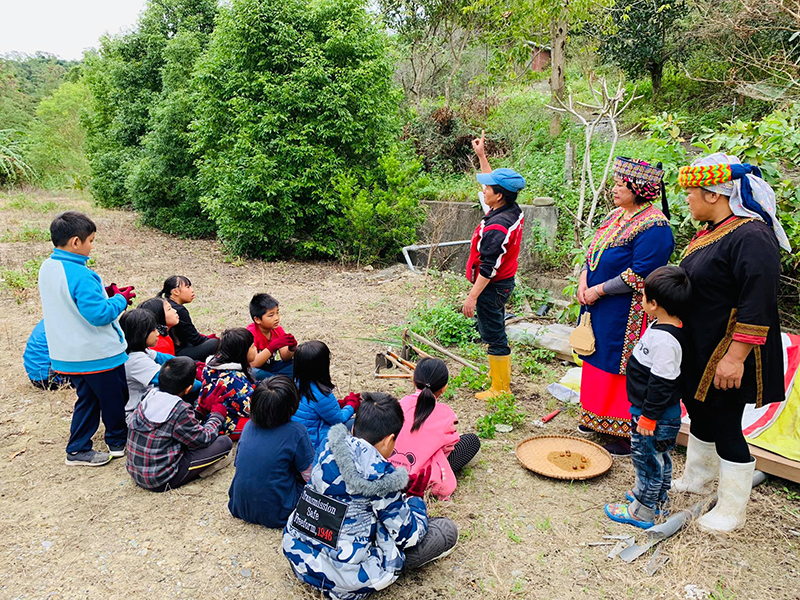
During Education on Food and Agriculture class, children are encouraged to get in contact with the land and learn more about Bunun culture.




